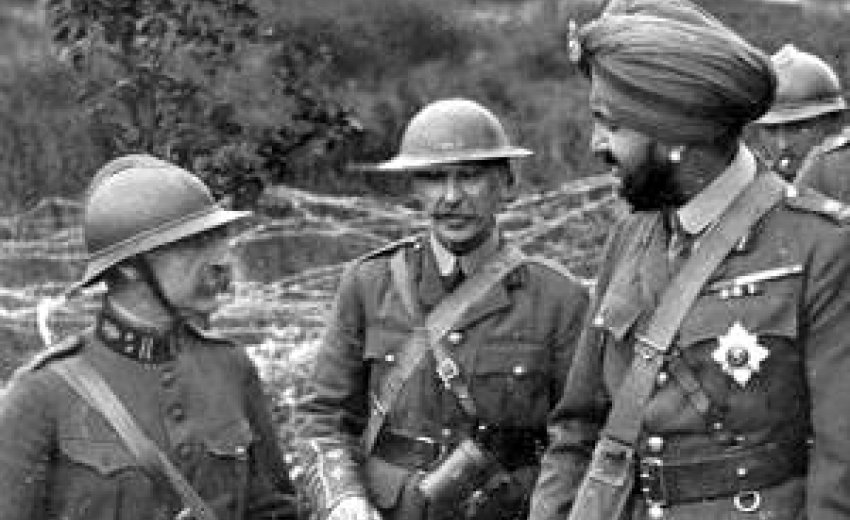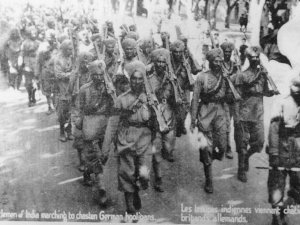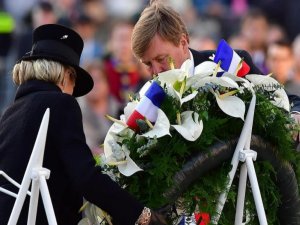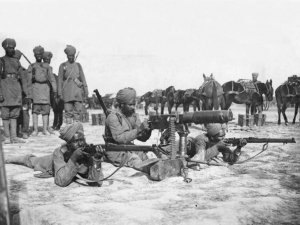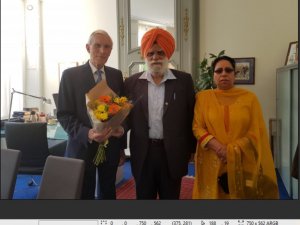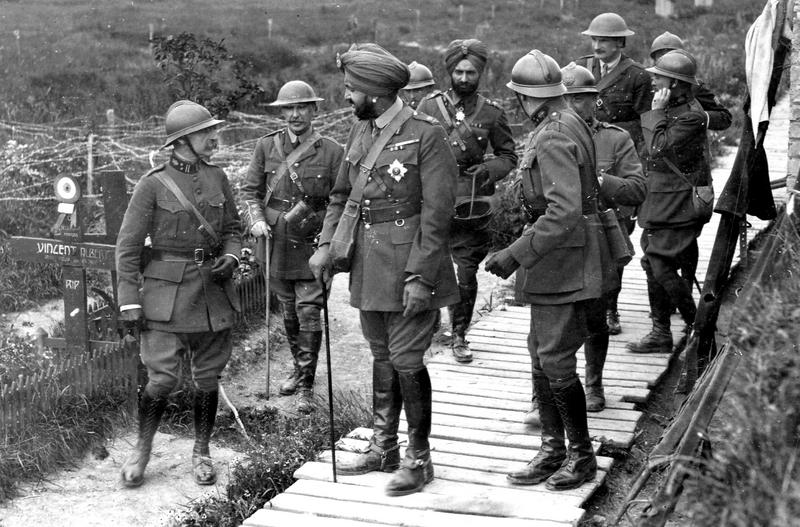
These letters of Sikh soldiers project their courage, loyalty, will to win the war or die like Sikh heroes. They have followed the great Sikh tradition of martyrdom laid down by their Guru Gobind Singh to protect and save the mankind from any type of oppression. Letters also narrates the condition in which they had to fight. The Great War was terrible and Sikhs have contributed by giving their lives in thousands. Most of the letter were detained and never reached destination.
In Europe, the Sikhs have fought in Belgium-Flanders at Ypres twice from 22 October 1914 till 31 October 1914 and from 22 April 1915 till 1st of May 1915 and in France at La Bassee, Neuve Chapelle from 10 to 13 marches 1915, Auber’s Ridge, Festubert, Loos 25 September 1915, Givenchy and Somme from July 1916 to November 1916.
To understand these letters from Sikh point of view, some history background is very essential.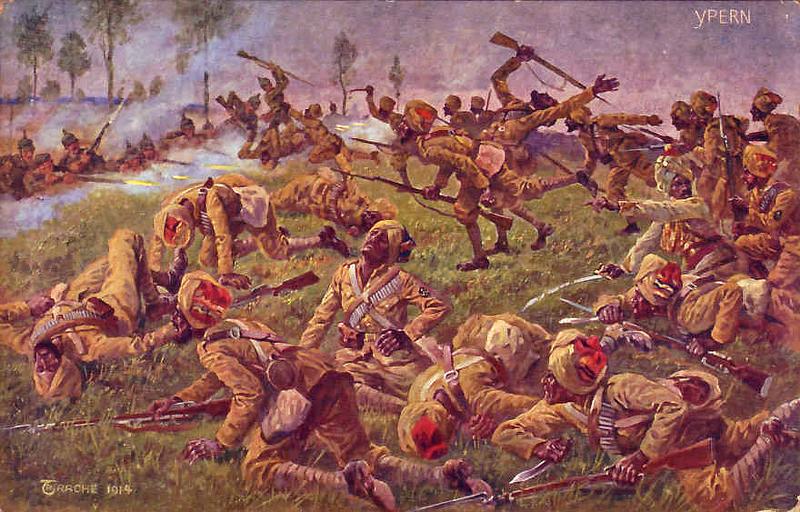
By the end of the eighteenth century the Sikhs had conquered most of the present Pakistan, Kashmir as well as the Punjab and most of the territories of the present Himanchal and Haryana provinces of India. Maharaja of Punjab Ranjit Singh (1780-1839) blocked the outside invaders forever by pushing them the other side of the Khyber Pass. In the east, River Sutlej was the boundary with the British.
Maharaja Duleep Singh GCSI (1838-1893), son of Maharaja Ranjit Singh was the last Maharaja of the sovereign state of Punjab and the Sikh Empire. After the end of the Second Anglo – Sikh War and subsequent annexation of the Punjab in 1849, he was deposed at the age of eleven by the East India Company and was sent into exile (1854) in England. He had 8 children.
*Sikh soldier’s love and regards for the family of Maharaja Ranjit Singh is well shown in the letter of Kartar Singh (Sikh, 15th Sikhs) to Gurdit Singh (Raswind, Punjab) from Milford –on –Sea on 24th February 1916 via letter no (253) (Gurmukhi)
“And my friend, this is the photo of our King’s granddaughter – he who was King of the Sikhs, Ranjit Singh. She has distributed her photo amongst Sikh brethren at the depot (Milford) on the evening of the 23rd February at five o’ clock.” (Written on the back of a photo of a lady friend, signed Sophia A. Duleep Singh 1916)
*The spirit (Chardikala), religious sentiments and facts of that situation are well described in the letter of Mohan Singh (Sikh) to Sirdarni Bishan Devi (Lyallpur District, Punjab. The letter (254) is written in Urdu on 25th February 1916 from 6th Cavalry, France.
“You say that you have heard that the entire Indian Army has left France. This is not so. The infantry have left but the cavalry is still upholding the honour of the Government here. By the Grace of God the cavalry are flourishing like fields of Sarson (rape seed) in the spring. At the present time much rain and snow are falling and consequently the cold is very severe. The snow accumulates all day….. Sirdar Buta Singh of Rawalpindi has sent a copy of the Granth Sahib. He has conferred a great favour on us, since we can have worship celebrated during our sojourn in a foreign land.”
*France is cold, full of milk and land of golden age, Bakhshis Singh (Sikh) of Sialkot Cavalry Brigade writes (in Gurmukhi) from France on 27th February 1916 to Sher Singh (Ferozepur District, Punjab. (255)
“Here is very cold at present. It snows much. The little discomfort that we experience is due to cold and rain. Otherwise the country is like heaven. It rains frequently. You are, no doubt, astonished at what I say and wonder how this country can be heaven. Listen to one little thing. Here no one drinks water. When they desire to drink, either at meals or any other time, they drink the juice of apples. So many apples are produced that the people press the juice and store it in barrels, (from) which they drink throughout the year. They let us have a bottle full for two pica (paisa). All the men drink it. There is no prohibition – you may bring as much as you like inside the house. Barrels upon barrels are full of it. Moreover there are barns full of apples. If I return alive I will tell you all about this country. You shall be staggered at all I shall tell you. It is real heaven. There is plenty of milk, but only cow’s milk. The people, however, drink very little milk. They milk the cows and then they extract the butter at the rate of a mound (40 kilo) of milk in ten minutes. The skimmed milk they give to cows, calves and pigs. The people are very honest. There is no sign of theft. Goods to the value of lakhs (hundred thousands) of rupees lie in glass houses. No one pays any regard to them. Grain, potatoes and such like things lie in the fields unguarded. In short, the cat plays with pigeons and chicken and the dog plays with the cat and tends the sheep, churns the butter and draws a cart and guards it too. When a cow calves, they immediately take away the calf and do not let the cow see it. They rear it on skimmed milk. The milk the cow daily – two or three times daily – without the calf being present. The cows in fact do not know whether they gave birth to a calf or not. It is the golden age.”
*Sowar Natha Singh (SIKH) to Sapuran Singh (Lyallpur District, Punjab wrote in Urdu (209) from FPO 19, France on 4th January 1916.
“The country is exceedingly pleasant. In it India is forgotten. I do not wish the war to end soon. I should like to die in this country and I have no intention of returning to India. If you want anything, write to me. May the Holy Guru save me from India? I hope you will answer this quickly, telling me you are well. I am in great comfort as I am always away from the squadron. Tell Basant Kaur from me to look carefully after the children and have them well schooled, fed and clothed. There is no need to think of the cost. She can spend as much as she likes on them. But I have no hope of seeing them again – nor do I wish to see them. For I have found a good opportunity of sacrificing my life and I hope to pay my debt with loyalty.
*Isher Singh (Sikh, 59th Rifles) to a friend (50th Punjabi, Punjab) wrote in Gurmukhi on 1st May 1915 from Indian General Hospital, Brighton describing the war of New Chappell. (63)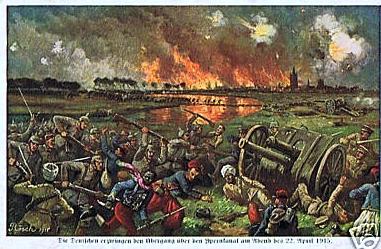 “The battle is being carried on very bitterly. In the Lahore Division only 300 men are left. Some are dead, some wounded. The division is finished. Think of it – in taking 50 yards of German trench, 50,000 men are killed. When we attack they direct a terrific fire on us – thousands of men die daily. It looks as if not a single man can remain alive on either side – then (when none is left) there will be peace.
“The battle is being carried on very bitterly. In the Lahore Division only 300 men are left. Some are dead, some wounded. The division is finished. Think of it – in taking 50 yards of German trench, 50,000 men are killed. When we attack they direct a terrific fire on us – thousands of men die daily. It looks as if not a single man can remain alive on either side – then (when none is left) there will be peace.
When the German attack they are killed in the same way. For us men it is a bad state of affairs here. Only those return from the battlefield that is slightly wounded. No one else is carried off. Even Sahib (English officers) is not lifted away. The battleground resounds with cries……. Here thing are in a very bad way. In France the news is that dog churn milk in machines and look after the cattle. A man who keeps a dog has to pay five rupees a month to the King.
Do not be anxious about me. We are very well looked after. White soldiers are always besides our bed – day and night. We get very good food four times a day. We also get milk. Our hospital is in the place where the king used to have his throne (Brighton Pavilion). Every man is washed once in hot water. The King has given strict order that no trouble be given to any black man in hospital. Men in hospital are tended like flowers and the King and Queen sometimes comes to visit them.’’
The words of Bakhshis Singh and others about France are even true today (2008) as about 8000 Sikhs are living in France, enjoying good life, prosperity and have established three Gurdwara’s there. Their generation will not go back to India to live.
But not everything is all right with the Sikhs now. As you must be aware, in March 2004 a law was passed in France that bans conspicuous religious symbols and attire in the classroom. Under this law, Sikh schoolchildren are banned from wearing the Sikh turban. The same people who fought for the freedom of mankind and the world including France have been denied their right of freedom. They all died or were wounded for the freedom of Britain and the world, and during shell fire, with no other protection but the turban, the symbol of their faith. A Sikh's right to wear his articles of faith has been challenged in schools, the workplace, Prisons and other public places. Sikhs suffer increased harassment at airports because they wear the Turban. Sikhs can’t have their photos with Turban on the Driving licence, Identity Card including French Passport. Is it not a shame on part of the French Government? Our forefathers did not give their lives that their children should suffer. This is a great injustice and Sikhs throughout the World, especially in France are fighting a legal battle.
Guru Gobind Singh (1666 - 1708) the 10th master of the Sikhs revealed Khalsa in 1699. Khalsa was to be a “politically and spiritually sovereign” entity, in direct line of Waheguru, the Supreme Sovereign. Khalsa is the direct subject of Akal Purakh (God). Hence the sovereignty of Khalsa is both temporal and transcendental. Guru Gobind Singh prescribed Khanday di Pahul (proper initiation ceremony) for those who wished to join Khalsa (the sovereign subjects of God) brotherhood. Thousands of Sikhs gave their lives under this spirit of the Khalsa during the times of the Guru Gobind Singh and later on it was this spirit that Khalsa fought the great Moguls in 17th and 18th century and established Khalsa Rule (Raj) under the leadership of Maharaja Ranjit Singh of Punjab.
The British had fought 8 wars against the Sikhs and they knew very well the martial spirit, war tactics and supremacy of the Khalsa army in all the battlefields. Though the Khalsa Army was banned after the close of the Second Anglo – Sikh War and the subsequent annexation of the Punjab in 1849 by unfair means (read History of the Sikhs by Dr. Harjinder Singh Dilgeer) but Sikh Army was reorganised again in 1858 and took part in all the major wars of the British including 1st and 2nd World Wars.
*The spirit of the Khalsa can be felt from a poem (295) written in (Gurmukhi) by Dafadar Nathan Singh (Sikh) to Sowar Paran? Singh of State Cavalry, Jind State, Punjab on 18th April 1916 from 2nd Lancers, France.
The Sikh roars like a lion on the field of battle,
And yields up his life as a sacrifice:
Whoever is fortunate enough to be born a Rajput
Never fears the foe in battle:
He gives up all thought of worldly pleasure,
And dreams only of the battle field:
He who dies on the field of battle,
His name never dies, but lives in history:
He who fronts the foe boldly in battle,
Has God for his protection:
Once a Sikh takes the sword in Hand,
He has only one aim: victory!
*A sepoy of the 47th Sikhs (Sikh) wrote (199) to a friend in Punjab from Brighton Hospital in Punjabi language on 14th December 1915.
“Chur Singh has suffered martyrdom in the war. The 47th Sikhs were charging. The Sahib (English officer) said,” Chur Singh, you are not a Sikh of Guru Gobind Singh, (you) who sit in fear inside the trench. Chur Singh was very angry. Chur Singh gave (the) order to his company to charge. He drew his sword and went forward. A bullet came from the enemy and hit him in the mouth. So did our brother Chur Singh become a martyr? No other man was like Jamadar Chur Singh.
*Loyalty of the Sikh soldier’s towards the King – Emperor of India is clearly visible from a wounded Sikh’s letter of 15th January 1915 from a hospital in England written to his brother ( Amritsar District, Punjab ) The letter (7) is written in Gurmukhi.
“Brother, I fell ill with pneumonia and have come away from the war. In this country it rains a great deal: always day and night it rains. So pneumonia is very rife. Now I am quite well and there is no occasion for any kind of anxiety…… If any of us is wounded or is otherwise ill, Government or someone else always treats him very kindly. Our Government takes great care of us and we too will be loyal and fight. You must give the Government all the help it requires. Now look, you my brother, our father the King – Emperor of India needs us and any of us who refuses to help him in his need should be counted among the most polluted sinners. It is our first duty to show is loyal gratitude to Government.”
*Sepoy Gurdit Singh (Sikh) to his father (Amritsar District, Punjab) wrote in Gurmukhi from Brighton Hospital on 6th April 1915. (48)
“Here it is said that men are being forced to enlist by order in India and they also say that plague is very rife. Write me some news of our country…… so long as the war goes on, no sound man can return to India – only those who have lost a limb can return. In my heart I feel that I shall have to go back to the war.”
*Gyan Singh (Sikh) wrote (52) to his brother in Punjab in Gurmukhi on 15th April from Indian Army Depot Milford – on – Sea.
“The German is very strong. His planes sail the clouds and drop shells from the sky: his mines dig up the earth and his hidden craft strike below the sea. Bombs and blinding acid are thrown from his trenches which are only 100 to 50 yards from ours. He has countless machine guns which kill the whole firing line when in attack. When he attacks we kill his men. The dead lie in heaps. England is full of wounded. No man can return to the Punjab whole. Only the broken – limbed can go back. The regiments that came first are finished – here and there a man remains. Reinforcements have twice and three times brought them up to strength but straightaways they were used up. The German is very strong.”
*Sepoy Baghel Singh (Sikh) wrote (47) to his brother (2nd Lancers, France) in Gurmukhi on 6th April 1915 from New Milton Hospital.
“I am not one of those who are to return to India. Only those go to India who have but one arm or one leg. This is the fact. German has made us a fine lot of specimens. It makes one cry and even laughs to see them.”
*Bir Singh (Sikh, 55th Rifles) to Ganga Singh (55 Rifles, Kohat, NWFP) wrote (98) from a Hospital in England in Gurmukhi on 17th July 1915.
“They take great care of us here as no one else would take except a man’s mother, not even his wife. If a man falls sick at home and remain ill for a month the whole household grows weary of his illness, but these people do not grow weary. The arrangements for our food are very good because men have been selected from the regiments to look after it and every man is served by his caste – fellows. First we suffered that the trenches were ill made but now they are very strong and there are no losses in the trenches and no hardship. Much rain falls and if you dig down a little way in the ground you come upon water. It is very cold but we have plenty of clothing and get good rations. Our regiment has got the better of all the other regiments. They agreed to eat biscuits and European bread but our regiment refused. So now we get atta and the other regiments get biscuits – and bad (ones) atl that. People told us that there was no atta in this country and we should have to eat biscuits; but, where there are inhabitants, there atta must be obtainable. Besides, there are plenty of mills.”
*A Sikh wrote (163) in Gurmukhi from FPO. 13, France to Mahant Partab Das (Patiala State, Punjab) on 18th October 1915.
“What you say in your letter about not being disloyal to the Emperor and it being the religion of Sikhs to die facing the foe – all that you say is true. But if only you yourself could be here and see for yourself! Any shrivelled Chars – Sodden fellow can fire the gun and kill a score of us at our food in the kitchen. Ships sail the sky like kites. Wherever you look, machine guns and canon begin to shoot and bombs fly out which kill every man they hit. The earth is mined and filled with powder; when men walk upon it, the powders is lit and up go the men! There is no fighting face to face. Guns massacre regiments sitting ten miles off. Put swords or pikes or staves in our hands and the enemy over us with like arms then indeed we should show you how to fight face to face! But if no one faces us what can we do? No one stands up to fight us. Everyone sits in a burrow underground. They fight in the sky, on the see in battleships, under the earth in mines. My friend, a man who fights upon the ground can hardly escape. You tell me to fight face to the foe. Die we must – but alas, not facing the foe! My friend, the cannons are such that they throw a shell weighing twelve maunds (12x40 kgs) which destroys the earth five hundred paces round about where it falls. We are in France. It is very cold country….. It is a fair country and the people are like angels. All they lack is wings….. The fighting is along a line of 300 miles. England, France, Italy, Belgium, Russia – these five are on one side; Germany, Turkey, Austria, Hungary, Bulgaria – these five on the other. The battle sways evenly balanced. None can kill the other. When it ends there will be peace. No one knows when this will be.”
*Page 51, A Sikh wrote to a friend in Punjab about the Battle of New Chappell, France.
“Now hear what happened to us. On the 9th March, the General told the Lahore and Meerut Divisions that they were to make a grand attack and glorify the name of the Punjab throughout Europe. The attack came off on the 10th at seve o’ clock in the morning. We fix bayonets and look towards the enemy. The enemy trenches are two yards off. They have been well built. In front is barded wire and we are not expected to attack here. With a shout to our Guru we hurl ourselves forward. The enemy’s bullets scorch our heroes while machine guns and cannons spread their shot upon us. We leap the wire entanglements and overwhelm the enemy, killing some and capturing the rest. On the 10th we captured 1050 Germans and took four lines of trenches defending the city of La Bassee. Here from the beginning the enemy have been very strong. On the 10th and 12th we took two miles of enemy position. Next day at five o’ clock the Germans attacked in eight lines. There was fine fighting on the battlefield. Eight lines of the enemy were destroyed. We also suffered grea loss in killed and wounded. On that day no one took thought of his friend and the slightly wounded man made his way back himself. If severely wounded, a man lay out in the battlefield. When the sun set in the evening, the rain began to fall. The wounded were picked up and sent back. The enemy attacked fiercely but were beaten back with great loss. We did not give up our trenches but pressed the enemy very hard. They could not recapture their lost lines. From the 10th to the 25th the German lost 70,613 men.”
*This letter (298) of Ganga Singh (Sikh) to Dafadar Jaswant Singh ( attached 6th cavalry, France ) written on 21st April 1916 in Gurmukhi , after the army has left Europe after 14 months and went to fight in Mesopotamia against Turkey shows the difficulties being faced by Lahore Division there.
“The 7th Brigade is surrounded in Mesopotamia*. Attempts have been made to rescue them, but without success. There was a fight on 6th March and heavy losses to us in the attempt to relieve them. Some men of ours are in the besieged force, twenty in number. They have eaten their horses and mules. They have a quarter of a pound of flour each per Diem. We are hopeful of being sent to join the relieving force.
*After being checked at Ctesiphon in November 1915, General Townshend’s British Indian force fell back to Kut – al – Amara, where they were invested by the Turks early in December. After enduring a five month siege, Townshend surrendered on 29th April 1916.
Courtesy of:
Omissi, David, Indian voices of the Great War. Soldier’s letters, 1914-18, London, 1999.
Note : The transcripts of the original letters are kept in the India Office Library at the British Library, London.
*Gurmukhi or Punjabi is the language of the people of Punjab.
*Urdu is the language of the people of Pakistan.
*(253, 254, 255 etc are letter numbers)
